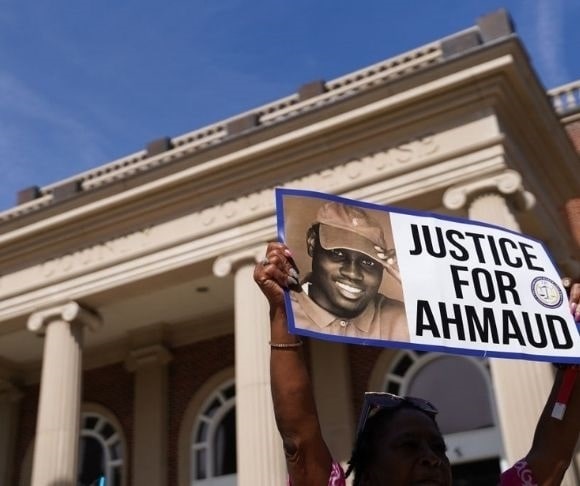After more than ten hours of deliberation, a jury found Travis McMichael guilty of all nine counts against him in the February 23, 2020, killing of Ahmaud Arbery. These include malice murder, felony murder, aggravated assault, and false imprisonment. In addition, his father, Greg McMichael, and neighbor William “Roddie” Bryan were also found guilty of felony murder, aggravated assault, and false imprisonment. Despite the conviction, however, the three men may have a chance at an appeal.
Stop, in the Name of the Law!

(Photo by Sean Rayford/Getty Images)
The trio tried to effectuate a citizen’s arrest of Arbery, whom they suspected of a burglary at the construction site of a neighboring home in the Satilla Shores area of Brunswick, Georgia. Arbery, a felon, was spotted casing the house in surveillance footage captured by cameras installed on the property to thwart thefts that had been ongoing. They chased him down with a shotgun, then shot him as they struggled over control of the firearm. To return these convictions, the jury must have found that arrest was performed illegally.
Andrew F. Branca, an attorney who specializes in the law of self-defense, said before the verdict:
“This entire case essentially hinges on the question of the underlying citizen’s arrest. If the effort to make a citizen’s arrest of Ahmaud Arbery was lawful, then everything that follows was likely also lawful. Conversely, if the effort to make a citizen’s arrest of Arbery was unlawful, then everything that follows was also likely unlawful.”
Judge Timothy R. Walmsley presided over the murder trial after all five judges in Brunswick recused themselves. Former district attorney Jackie Johnson was arrested after allegedly helping shield the suspects involved in the killing of Arbery. Gregory McMichael had been a longtime investigator in her office and was a former Glynn County police officer. Linda Dunikoski of the Cobb Country district attorney’s office was the lead prosecutor, and she may have given the defendants hope for success on appeal.
It’s “just” Beyond a Reasonable Doubt
Ms. Dunikoski appears to have misstated the “beyond a reasonable doubt” standard to jurors during the course of the trial. Her bio states: “I am a career prosecutor with 17 years of experience in the courtroom, handling complex cases from inception to verdict.” That kind of experience may recommend her to many opportunities in the law, but it condemns her own actions in the Arbery case. As she made her closing argument to the jury, she said:
“It’s just beyond a reasonable doubt. In other words, do you think they committed the crime? Okay, if you go, ‘Yeah, I think they committed the crimes,’ you’re good. That’s all you need.”
Ms. Dunikoski’s words are an accurate articulation of the preponderance of the evidence standard – a lower standard used in civil trials, but never criminal trials. If she were a civil lawyer who, by circumstance, were thrust into a criminal proceeding, then this misstatement of the state’s burden in a criminal case might be a mistake. However, since she is a career criminal prosecutor, those seeking a route to appeal will likely argue that she wished to confuse the jury and have them convict without meeting the highest proof burden required by the law in any proceeding. The defense objected to her statement, but the judge did not strike her words or instruct the jury they were a misstatement of the law.
It remains to be seen if such misstatement provides enough purchase for an appeal, which will likely be forthcoming from the defendants. The convicted men will face sentencing on the charges at a later date, but under Georgia law, 35-year-old Travis McMichael will have to spend at least 30 years in prison. The McMichaels and Bryan are also facing federal hate crimes charges. A separate trial in the federal case is scheduled to begin on February 7, 2022.
~ Read more from Scott D. Cosenza.




